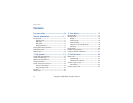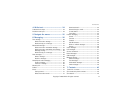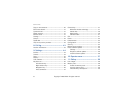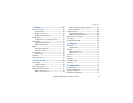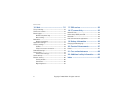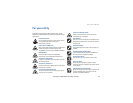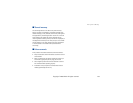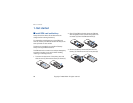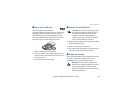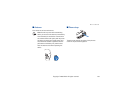
9 Copyright
©
2006 Nokia. All rights reserved.
For your safety
9
EMERGENCY CALLS
Ensure the phone function of the device is
switched on and in service. Press the end key as
many times as needed to clear the display and
return to the standby mode. Enter the emergency
number, then press the call key. Give your location.
Do not end the call until given permission to do so.
■ About your device
The wireless device described in this guide is approved for use
on the EGSM 900, and GSM 1800 and 1900 networks. Contact
your service provider for more information about networks.
When using the features in this device, obey all laws and
respect local customs, privacy and legitimate rights of others,
including copyrights.
Copyright protections may prevent some images, music
(including ringing tones), and other content from being copied,
modified, transferred, or forwarded.
Warning: To use any features in this device, other
than the alarm clock, the device must be switched
on. Do not switch the device on when wireless device
use may cause interference or danger.
■ Network services
To use the phone you must have service from a wireless service
provider. Many of the features require special network
features. These features are not available on all networks;
other networks may require that you make specific
arrangements with your service provider before you can use
the network services. Your service provider can give you
instructions and explain what charges will apply. Some
networks may have limitations that affect how you can use
network services. For instance, some networks may not
support all language-dependent characters and services.
Your service provider may have requested that certain features
be disabled or not activated in your device. If so, these features
will not appear on your device menu. Your device may also
have a special configuration such as changes in menu names,
menu order, and icons. Contact your service provider for more
information.
This device supports WAP 2.0 protocols (HTTP and SSL) that
run on TCP/IP protocols. Some features of this device, such as
multimedia messaging (MMS), e-mail application, instant
messaging, remote synchronization, and content downloading
using the browser or MMS, require network support for these
technologies.





